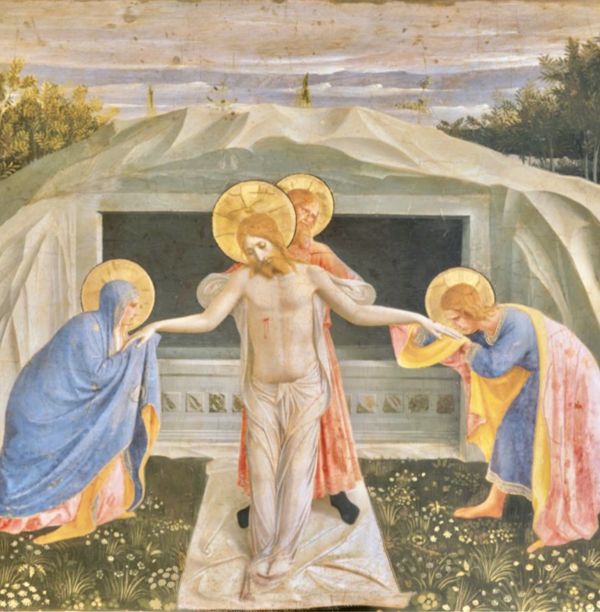«Having left the tomb early with fear and great joy, the women ran to make the announcement to his disciples» (Mt 28:8).
The Angel Monday liturgy portrays the joy of the women who are entrusted with the annunciation to their brothers to go to Galilee: there they would see him!
Francis and Clare of Assisi lived Easter every day, and every morning was a favourable opportunity to witness that the Cross had blossomed into the almond tree of the Resurrection.
Every moment was the right time to praise the Crucified and Risen Lord, and to invite all creatures to praise him, for the Two Poor Men belonged to the world of the small and simple.
Francis wasted no opportunity to announce the Good News.
He, Jesus' beloved disciple, and Clare, 'the other Mary', had been at the tomb. They had found the rolled stone and by their existence narrated the regeneration they had experienced.
The joy of Easter was inscribed in their hearts and the Sources help us to understand it well.
"As Francis went about towns and castles, he began to preach everywhere with greater commitment and confidence, not resorting to persuasive reasoning based on human wisdom, but relying on the doctrine and virtue of the Holy Spirit, confidently proclaiming the kingdom of God.
He was an evangeliser of the truth, made strong by apostolic authority. He did not resort to flattery, he scorned fine talk.
What he proposed to others in his exhortations was first and foremost his own personal conviction; thus he was able to proclaim the truth sincerely" (FF 1463).
Indeed, the only Truth to be proclaimed was and is Christ risen from the dead, the Hope of Glory!
He always urged his brothers to celebrate Easter, faithful to the poverty of Christ:
"Even on major feasts, when there was an opportunity, he used to go for alms. Because, he said, in the poor of God the word of the prophet is fulfilled: man has eaten the bread of Angels.
The bread of the Angels is that which holy poverty gathers from door to door and which, asked for the love of God, for the love of God is bestowed, at the suggestion of the holy Angels" (FF 1129).
Contemplating the Beauty of God, which recalls the Easter Light of the Resurrection, in the Praises of God Most High, Francis expressed himself thus:
«You are holy, Lord, only God, who works wonderful things.
Thou art strong, Thou art great, Thou art most high,
Thou art King Almighty, Thou holy Father, King of heaven and earth.
You are triune and one, Lord God of gods.
You are the good, every good, the supreme good, the living and true Lord God [...]» (FF 261).
With humility and trust in the Lord, the dawn of the Resurrection inhabited every gesture of the Alter Christus and Clare, in every daily event.
Monday of the Easter Octave (Mt 28:8-15)












